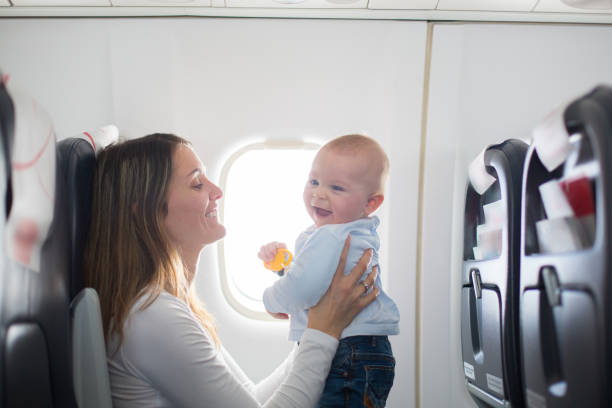Traveling with an infant can feel daunting, especially when it involves air travel. However, with a few tried-and-true tips, you can make the experience smoother and more enjoyable for both you and your little one. Here are some essential tips to keep in mind when preparing for and traveling on an airplane with an infant.
1. Book Flights Wisely
Direct Flights: When possible, book direct flights to avoid layovers, reducing the total travel time.
Timing Matters: Consider booking flights during your baby’s nap or sleep schedule, as the gentle hum of the airplane can help lull them to sleep.
Seating Preferences: If the plane isn’t full, ask the airline staff if they can block a neighboring seat. The extra space can be helpful for diaper changes or simply to give you and the baby a bit more room.
2. Pack Essentials in the Carry-On
Diapers and Wipes: Always pack more diapers than you think you’ll need, along with plenty of wipes for clean-ups.
Extra Clothes: Bring extra outfits for your baby and at least one spare shirt for yourself in case of spills or accidents.
Blanket and Extra Layers: Airplane cabins can be chilly, so bring a blanket and dress your baby in layers for added warmth.
Sanitizing Wipes: Airplanes are shared spaces, so wiping down the armrests, tray tables, and seatbelt buckles with sanitizing wipes can help keep germs at bay.
3. Plan for Feeding
Nursing or Bottle-Feeding During Takeoff and Landing: The change in cabin pressure can be uncomfortable for a baby’s sensitive ears, leading to fussiness. Feeding your baby (whether nursing or using a bottle) during takeoff and landing can help alleviate this pressure.
Pack Extra Bottles or Formula: If you’re bottle-feeding, bring enough formula or breast milk to last the entire flight, plus extra in case of delays.
Snacks for Older Babies: If your infant has started solid foods, bring snacks like puffs or crackers. Not only are they easy to pack, but they also help distract a restless baby.
4. Bring a Baby Carrier or Wrap
Hands-Free Option: Having a baby carrier allows you to keep your hands free while navigating the airport, which can be a lifesaver.
Comfortable for Baby: Many infants feel secure in a carrier and are likely to sleep on you, especially when the plane takes off and during long stretches of the flight.
Easier Boarding: Wearing your baby also helps you manage carry-on items with ease, especially during boarding.
5. Utilize a Stroller or Travel System
Bring a Lightweight Stroller: If you prefer not to carry your baby all the time, a stroller is ideal. Many airlines allow you to check your stroller at the gate for easy access once you land.
Convertible Car Seat/Stroller Systems: If you have a travel-friendly car seat that fits onto a stroller base, this can simplify transitions from the airport to the plane and at your destination.
6. Be Prepared for Security Checks
Prepare Liquids Ahead of Time: Breast milk, formula, and baby food are allowed through TSA in reasonable quantities. However, you may need to declare these items and go through additional screening, so pack them in easy-to-access containers.
Pack Smart for Quick Access: Keep diapers, wipes, and bottles within easy reach in your carry-on so you’re not digging around when you need them.
7. Entertainment and Comfort
Favorite Toys and Comfort Items: Pack a few small, quiet toys or comfort items that your baby enjoys to keep them entertained. A soft stuffed animal or a small blanket can make a big difference.
New Surprises: Bring a new toy or book that your baby hasn’t seen before. The novelty can provide extra distraction and keep them entertained longer.
Download Baby-Friendly Shows or Music: For older infants, playing soothing music or baby-friendly shows on a tablet or smartphone with headphones may keep them calm.
8. Practice Patience and Manage Expectations
Relax and Stay Positive: Infants can pick up on their parent’s emotions, so try to stay calm even if things get challenging.
Prepare for Interruptions: Realize that interruptions are inevitable, and it’s okay if your travel doesn’t go perfectly. Fellow passengers and flight attendants often understand and are usually supportive.
Build Extra Time: Give yourself plenty of time at the airport and be prepared for last-minute diaper changes or feedings.
9. Consider Boarding Options
Pre-Boarding for Families: Many airlines allow families with young children to board first. This can be helpful for settling in and stowing away luggage.
Last-Minute Boarding: Some parents prefer to board last so their baby has more time to move around before sitting down on the plane. Choose the option that best suits you and your baby’s needs.
10. Handling Diaper Changes on the Plane
Airplane Bathrooms: Most airplanes have a changing table in at least one of the lavatories, but space can be tight. Bring a small changing mat to make this process as smooth as possible.
Diaper Disposal: Pack disposable diaper bags to contain any smells, and be mindful of others by disposing of soiled diapers quickly.
11. Rest When Your Baby Sleeps
Take a Break: When your baby is sleeping, try to relax and get some rest yourself. This may be a good time to take a quick nap or read a book, as you’ll need extra energy to handle the trip.
12. Ask for Help When Needed
Seek Help from the Flight Attendants: Don’t hesitate to ask for help. Whether it’s asking for extra water or needing an extra hand with your luggage, flight attendants are usually accommodating to families traveling with infants.
Accept Offers of Assistance: If fellow passengers offer help, take it. Traveling with an infant is no small feat, and accepting help can make the journey much smoother.




